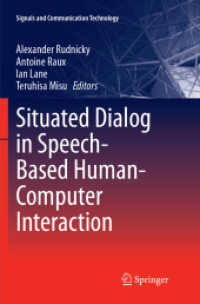基本説明
This volume is a compilation of the most important essays by a pioneer in Canadian legal history.
Full Description
This volume in the Osgoode Society's distinguished series on the history of Canadian law is a collection of the principal essays of Professor Emeritus R.C.B. Risk, one of the pioneers of Canadian legal history and for many years regarded as its foremost authority on the history of Canadian legal thought.
Frank Scott, Bora Laskin, W.P.M. Kennedy, John Willis and Edward Blake are among the better known figures whose thinking and writing about law are featured in this collection. But this compilation of the most important essays by a pioneer in Canadian legal history brings to light many other lesser known figures as well, whose writings covered a wide range of topics, from estoppel to the British North America Act to the purpose of legal education. Written over more than two decades, and covering the immediate post-Confederation period to the 1960s, these essays reveal a distinctive Canadian tradition of thinking about the nature and functions of law, one which Risk clearly takes pride in and urges us to celebrate.
Contents
FOREWARD
Introduction
PART ONE
The Classical Age: Canadian Legal Thought in the Late Nineteenth Century
Constitutional Scholarship in the Late Nineteenth Century: Making Federalism Work
A.H.F. Lefroy: Common Law Thought in Late-Nineteenth-Century Canada - On Burying One's Grandfather
Rights Talk in Canada in the Late Nineteenth Century: 'The Good Sense and Right Feeling of the People'
Blake and Liberty
John Skirving Ewart: The Legal Thought
Sir William R. Meredith, CJO: The Search for Authority
PART TWO
The Challenge of Modernity: Canadian Legal Thought in the 1930s
Volume One of the Journal: A Tribute and a Belated Review
The Scholars and the Constitution: POGG and the Privy Council
John Willis: A Tribute
The Many Minds of W.P.M. Kennedy
Canadian Law Teachers in the 1930s: 'When the World Was Turned Upside Down'
PART THREE
Postwar Developments
On the Road to Oz: Common Law Scholarship about Federalism after World War II





